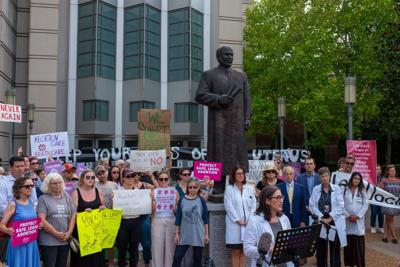A three-judge panel has ruled against the state's attempt to end a lawsuit challenging Tennessee’s nearly total abortion ban.
In 2023, alongside the Center for Reproductive Rights and the American Medical Association, a group of Tennessee OB-GYNs and women who had experienced serious medical problems during pregnancy brought a lawsuit against the state of Tennessee. The plaintiffs claimed it was unclear which circumstances “prevent serious risk of substantial and irreversible impairment of a major bodily function,” as part of the medical exception to the ban.
Tennesseans sue the state over lack of medical exceptions in ban
In 2024, the Davidson County Chancery Court ruled that Tennessee doctors who provide abortions during a medical emergency to protect the life of the mother will not be punished. At the time, the court determined that an abortion is permitted when any of the following conditions are present: premature rupture of the amniotic sac that surrounds the fetus; fatal fetal diagnoses that result in severe preeclampsia or mirror syndrome associated with fetal hydrops; and fatal fetal diagnoses leading to an infection that will result in uterine rupture or potential loss of fertility, in addition to inevitable abortions.
Following that ruling and changes in legislation during this year's session of the Tennessee General Assembly, state attorneys asked for a ruling in their favor without trial. The Republican-backed legislation — which Democrats said was passed just to shut down this lawsuit — did not add any additional exceptions to the state’s abortion ban, but instead named a small list of complications that could qualify for an exception, echoing the 2024 ruling. Legislation allowing for exceptions in cases of rape, incest or fatal fetal anomaly (a fetus that would not survive outside the womb) has failed in the past several legislative sessions. Physicians have advocated against the ban since it went into effect in 2022.
Judge gives temporary injunction, citing infringement of free speech
The Davidson County Chancery Court ruled this week that those clarifications were not enough to alter the case. It also ruled in a separate decision that the plaintiffs could obtain internal documents from the Tennessee General Assembly, the governor and legislative committees related to the state enforcing the amended abortion ban and medical exceptions.
In addition, a United States district judge ruled in September of last year that the state's “abortion trafficking” legislation will not be enforced for now, with a judge ruling that it infringes upon the First Amendment right of free speech. The law puts people at risk for prosecution if one “intentionally recruits, harbors, or transports a pregnant unemancipated minor” for the purpose of receiving an abortion or obtaining abortion pills.







